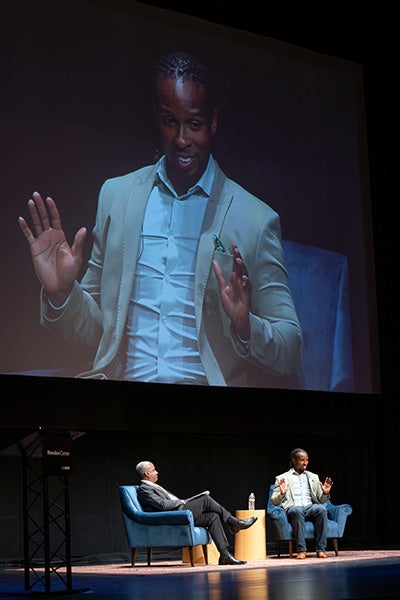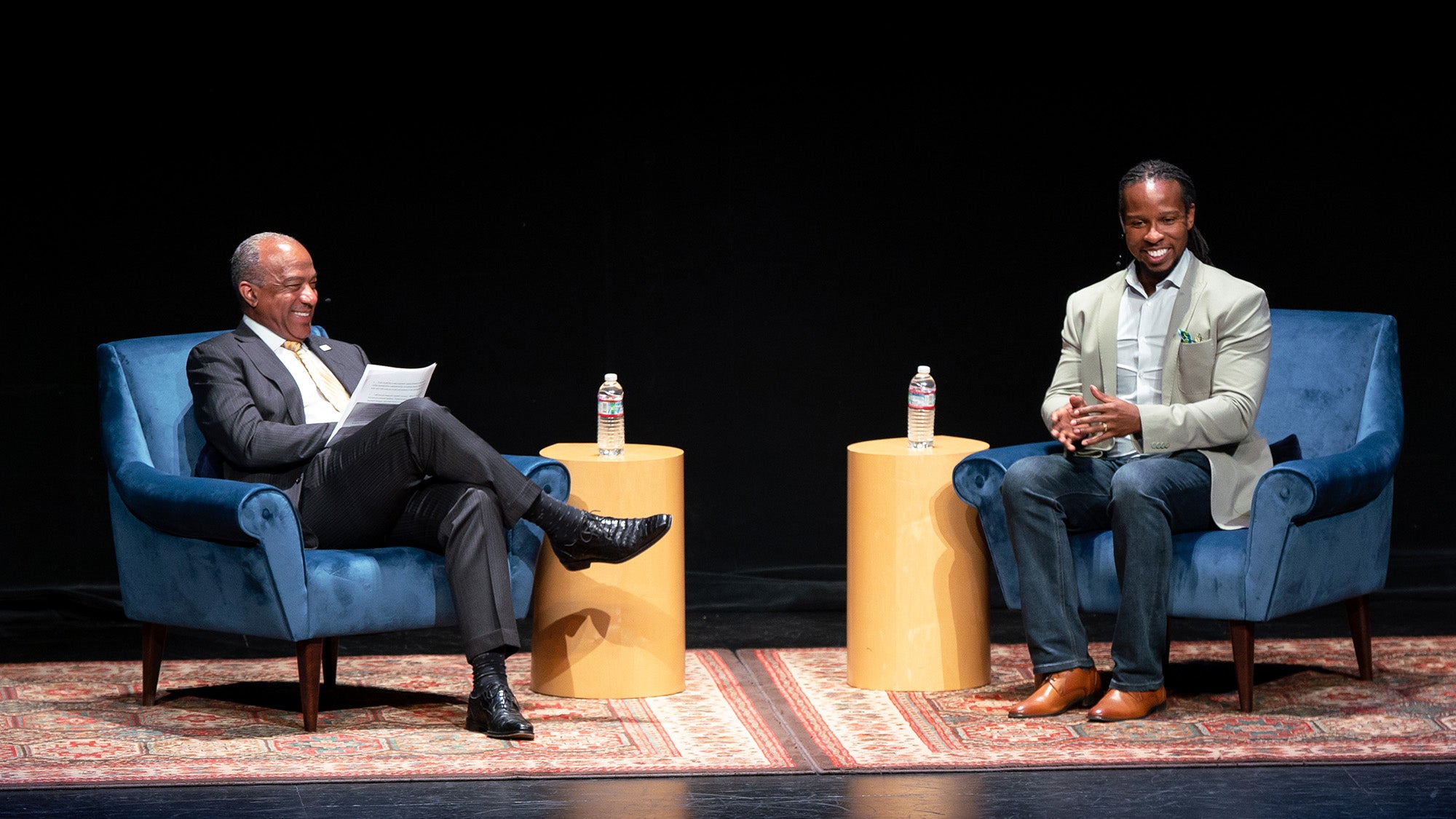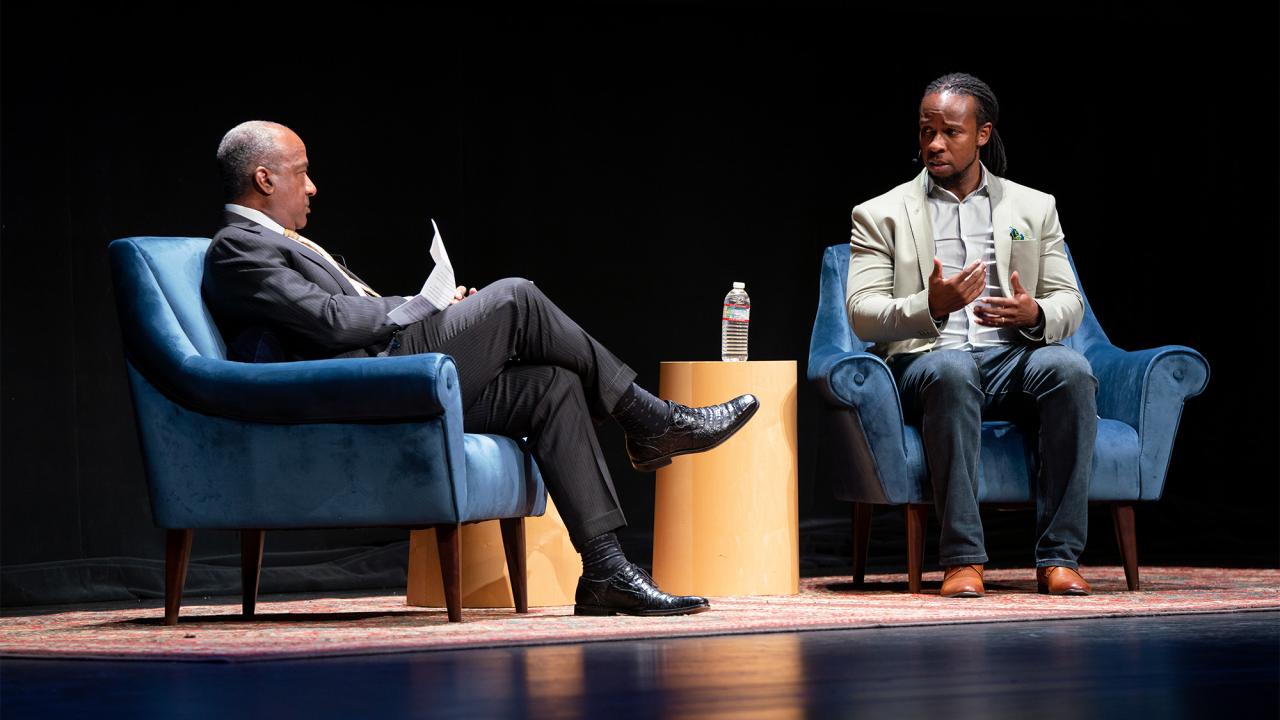Everyone has the power to fight the structures that uphold racism — from the people who write or enforce laws to ordinary people who can join organizations to make their voices heard, author and historian Ibram X. Kendi told Chancellor Gary S. May and an audience of more than 1,600 people at the Mondavi Center for the Performing Arts last week.
“In many ways we as individuals are taught we don’t have power,” Kendi said. “First and foremost, it’s important for every individual to realize that they have the power to challenge that structure.”
EDUCATIONAL USE OF PANEL RECORDING
The replay of Kendi’s afternoon panel discussion (the conversation with Chancellor May was not recorded) is available over the next year for educational use, like an instructor showing it to a class or a campus unit watching it for educational purposes. Anyone interested in requesting the video can do so by sending an emailing with their proposed use.
Kendi is the Andrew W. Mellon Professor in the Humanities at Boston University and the founding director of its Center for Antiracist Research. He sat down with Chancellor May as the author of How To Be an Antiracist, UC Davis’ 2021-22 Campus Community Book Project, which has been the subject of dozens of campus programs dating back to fall.
During his campus visit March 31, he also participated in an afternoon panel discussion, a free program at the Mondavi Center.
In his nighttime appearance, Kendi began by defining racist ideas as any concept promoting the idea that any one racial group is superior or inferior to another. He said that in 2022, most people don’t directly say groups are inferior, but do say things like: “This is what’s wrong with Latinx immigrants.”
In the headlines
Kendi and May went on to discuss the parallels between racism today and racism hundreds of years ago (people who lynched Black people claimed they weren’t racist, just as many people today deny their own racism, Kendi said), the ways racism and sexism intersect, and future books Kendi plans to publish.
Kendi made national headlines a week before his visit to campus, when Sen. Ted Cruz (R-Texas) criticized his children’s book, Antiracist Baby, during the confirmation hearing of Supreme Court justice nominee Ketanji Brown Jackson, saying the book was part of a curriculum of critical race theory.

May pointed out that Cruz’s actions had driven up sales of Kendi’s books, prompting cheers and applause from the audience.
Kendi joked the events had taught him — to his surprise — that not only was he a critical race theorist, but so was his preschool-aged daughter. He said it’s important to know the history of terms like critical race theory, which takes the place of “anti-white” in the minds of white supremacists.
He touched on the history of racism as well as its future: He said he’s looking forward to reading his forthcoming book, Goodnight Racism, to his daughter, because it imagines a world where racism no longer exists.
“We live in a dangerously racist society,” he said. “And who are the most vulnerable to those dangers? Our children.”
Audience Q&A
Kendi and May took questions from the audience on a variety of topics, like metaphors in Kendi’s books, and efforts by the chancellor and others to increase diversity at UC Davis.
“I was most impressed by the students’ questions,” said Alli Griffith, who works in Student Housing and Dining Services.
Duane Lindsay, another staff member in Student Housing and Dining Services, said he felt inspired seeing students ask questions on aspects of racism and Kendi’s work he hadn’t even considered.
Raquel Aldana, a Martin Luther King Jr. Professor of Law at UC Davis, said she appreciated Kendi’s faith in humanity and his assertions that everyone has power. “It gives us agency,” she said. “It’s an important reminder, otherwise it feels very dark.”

Taking action
Aaliayah McKnight Corcran, a second-year law student, said she felt like the evening’s discussions could lead to tangible action.
“Sometimes in higher ed, antiracism can be very performative,” she said, adding that she appreciated the way the evening touched on actionable things people can do. “Those little steps are how we get to that bigger picture.”
The Division of Student Affairs over the last two quarters hosted discussions on the book and larger conversations about anti-Blackness.
Kawami Evans, the director of inclusion and organizational development for Student Housing and Dining Services, said the division purchased about 200 tickets for the talk.
“It felt like a really important conversation for us to be having,” she said.
BOOK PROJECT’S CONCLUDING EVENTS
- “Impact of Disasters on Vulnerable Human Populations with Backyard Animals,” with Lais Costa, director of operations, Veterinary Emergency Response Team, One Health Institute, and director, International Animal Welfare Training Initiative, School of Veterinary Medicine (April 6, remote)
- “The Community Integration of Intellectual Disability: UC Davis Brings Post-Secondary Education to California,” with Matthew Conner, student services librarian, UC Davis Library; and Elizabeth Foraker, co-director, Redwood SEED Scholars Program (April 12, in person)
Media Resources
Cody Kitaura is a News and Media Relations Specialist in the Office of Strategic Communications, and can be reached by email or at 530-752-1932.
